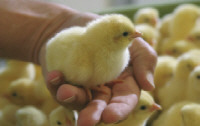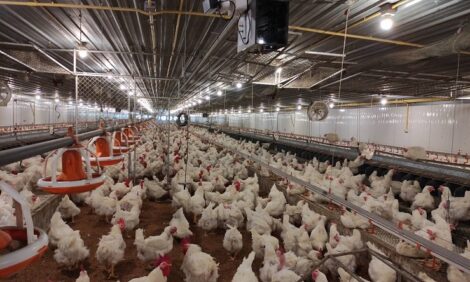



Supermarkets Awarded for Animal Welfare
UK - Marks & Spencer was named Compassionate Supermarket 2007 last night (Saturday 1 December) at an award ceremony in London by leading farm animal welfare charity Compassion in World Farming.
Marks & Spencer has led the way in raising the standards of animal welfare across UK supermarkets. For ten years it has sold only free range eggs and more recently stopped selling white veal and next year is committed to only selling rosé veal.
Sainsbury’s also proved its commitment to improving the lives of farmed animals with a double whammy taking home the award for Best Volume Retailer (beating the other top three market value supermarkets Tesco, Morrisons and Asda) and Most Improved Supermarket.
A survey looking at the welfare of a range of animals farmed for our supermarket trolleys revealed that one of the biggest improvements for animal welfare was the growing trend towards supermarkets selling free-range eggs and ditching cruel battery cage eggs.
The survey, conducted every two years, also showed that although supermarkets are improving their welfare policies and practices (Sainsbury’s had improved by 28 per cent on the 2005 survey) many of the animals producing the meat, fish, eggs and dairy for the supermarket shelf face unnecessary suffering.
To make it easy for consumers who want to shop compassionately, Compassion in World Farming is recommending what products to look out for when doing the weekly shop. Check out their guide at www.ciwf.org.uk/supermarkets or you can order their handy pocket-sized guide to carry around with you.
“High animal welfare is at the heart of our business so it’s fantastic news that our efforts have been recognised by Compassion in World Farming.
Steven Esom, Director of Food, Marks & Spencer
Steven Esom, Director of Food, Marks & Spencer said: “High animal welfare is at the heart of our business so it’s fantastic news that our efforts have been recognised by Compassion in World Farming.
“In 1997 M&S led the way when it switched to only selling free range eggs. Ten years on we are still making industry leading commitments to further improve animal welfare standards, not least the recent move to ban imported white veal and reduce the stocking density of our chickens.”
Judith Batchelar, Director of Sainsbury’s brand said: "We are thrilled that the hard work we have put into improving animal welfare has been recognised with these two awards.
They complement the Compassion In World Farming Good Egg Award we received earlier this year, in recognition of our commitment to sell only cage-free eggs ahead of 2012. Sourcing with integrity is extremely important to Sainsbury's and to our customers, and we will continue to work closely with the farming community to further improve animal welfare in this country.”
Lesley Lambert, Director of Research at Compassion in World Farming said “Although we have seen some real progress in terms of farm animal welfare, it must not be forgotten that the majority of farm animals are reared intensively with serious impacts on their welfare. Do not be mistaken, there is still a long way to go. Consumers can use their purchasing power by buying higher welfare products – directly improving animals’ lives.”
How they scored: Best and worst supermarkets
In order of farm animal welfare performance, the most compassionate supermarkets are:
| Marks & Spencer | 3.99 Winner: Compassionate Supermarket 2007/08 |
| Waitrose | 3.98 |
| The Co-operative Group | 2.88 |
| Sainsbury’s | 2.67 Winner: Most Improved 07/08 & Best Volume Retailer 07/08 |
| Tesco | 2.63 |
| Morrisons | 2.36 |
| Somerfield | 1.89 |
| Asda† | 1.86 points out of 5 |
† Throughout the survey, Asda’s results come from the 2005 supermarket survey as they did not participate this year.
Good examples
M&S dairy produce and veal: M&S reward dairy farmers for higher welfare. All cattle have seasonal access to pasture. They encourage farmers to rear male calves for UK beef or veal, instead of exporting them or shooting them at birth. From 2008 M&S only sell UK rosé veal - calves reared in higher welfare British systems on straw.
Sainsbury’s Woodland Eggs: Hens are naturally forest birds. Woodland Eggs improve hen welfare and the environment by providing tree cover, encouraging the birds to range fully outdoors.
Co-op own-label fresh chicken: from 2008 all Co-op fresh chickens are Elmwood chickens – British, a slightly slower-growing breed, living for longer in enriched environments. Free range or indoors with more space, natural light and sawdust bales to perch on, helping to maintain natural behaviour and improve welfare.
Waitrose own-label fresh pork, bacon and sausages: Waitrose banned sow stalls and farrowing crates for production of own-label fresh pork, bacon and sausages. Sows give birth outdoors, so piglets start life outdoors and are reared on straw. Their traditional-breed free-range and organic pigs spend most of their lives outdoors.
Tesco dairy produce: From 2008, Tesco’s own-label dairy farmers cannot export male dairy calves. Calves stay in the UK, many going to Tesco’s higher welfare calf-rearing units. Tesco standards emphasise good calf management. This is a huge improvement for farm animal welfare.
Concerns for the future
Despite overall improvements from most supermarkets the survey also reveals that:
- According to the supermarkets themselves, more than 90 per cent of chickens sold in the UK are factory farmed
- More than two thirds of pigs are routinely tail-docked – a practise banned by law in the UK and EU
- Some supermarkets sell farmed fish that are starved for up to 15 days
- Some supermarkets are still selling pigmeat derived from sows kept in confinement systems which are illegal in the UK
- Although more than a third of the British public buy free-range whole eggs, more than 75 per cent of products containing egg (quiche, cake, etc) use battery cage eggs
- Some major supermarkets still sell veal reared in European systems without bedding – again, this system is illegal in the UK
- Most supermarkets sell milk from cows whose calves are shot at birth or exported live to continental Europe








